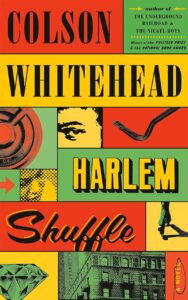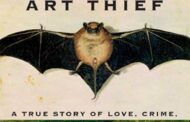Book Short
‘Harlem Shuffle’
by Colson Whitehead
Review by Stephanie Miller

Staying straight when everyone around you is getting rich by being crooked is a storyline as old as human nature. In the hands of two-time Pulitzer Prize winning author Colson Whitehead, it takes the shape of a family saga that is also an homage to Harlem in the 1960’s.
Ray Carney, the uptown hero of “Harlem Shuffle,” reminds himself repeatedly that he’s only “slightly crooked,” but it’s enough to suck him into the center of a botched heist of the “Waldorf of Harlem,” the Hotel Theresa. By day, Ray is an upstanding businessman with his own furniture store on 125th Street. He’s a good man and a fine local booster, offering payment installment plans that allow his customers to take home beautiful sofas and chairs, but threaten to bankrupt his store.
By night, Ray has a different clientele. Thanks in part to his careless and thoughtless cousin Freddie, who repeatedly runs with unscrupulous pals and needs constant rescuing, Ray serves as a small-time fence for the occasional ring or necklace that Freddie brings around. Soon, Freddie drags him into the Hotel Theresa robbery. Ray finds himself doing a steady business in hot jewels. This necessitates bribes to policemen and shaky alliances with local thugs to avoid getting knifed by vicious gangsters or ratted out by any one of a number of duplicitous, unsavory characters.
Loyalty to Family
Unwilling to toss Freddie aside (family is family!), and still striving for respectability, Ray is walking a thin line. His first attempts to outsmart the game result in some bad burns and humiliation. With great patience and no small amount of investment, he learns how things really work in Harlem and around the city and makes one final push to maneuver around the corruption, greed, and violence to earn his share of the pie.
Throughout, he is faced with all kinds of moral choices—and he responds to most of them with loyalty to family and dedication to his employees, customers, and neighborhood. Whitehead’s fast-paced novel forces us to consider whether being “slightly crooked” really is a good way to maintain a reputation for quality furniture, while keeping house and home together.
Micro Shorts
‘We Demand: The Suffrage Road Trip,’ by Anne B. Gass
This is an astonishing novelization of the true story of four women traveling across the country in 1915 to bring the “miles long” petition for a federal bill of voting rights for women to a reluctant President Wilson. It was an incredibly dangerous journey, made even more difficult by the frenetic pace to visit dozens of cities. I found none of the four women likable. But I admire how they stayed committed to the challenge together despite their vastly different characters and interests, all while traveling across thousands of dusty, hot, misogynistic miles in an open car. Gass is a terrific researcher, and she actually recreated the trip herself in 2015, recorded at www.suffrageroadtrip.blogspot.com.
‘Champagne and a Gardener,’ by B. J. Morison (Maine author!)
I found this first of five “A Little Maine Murder” mysteries in the treasure trove of books stacked on the floor of Yes! Books on Congress Street, in front of the shelf for Maine writers. In it, we meet a very proper Boston family working and playing on the “backside” of Mt. Desert Island. We enjoy this wonderful, nostalgic story about life during the mid-20th Century amid the familiar Maine backdrop of conflict between the locals and the summer people. Even though not much happens until the last two chapters when the murder occurs, I loved the easy pace and well-drawn characters. It was like being a visitor witnessing the private conversations of eccentric locals. It’s also a very clever mystery, with the end coming quickly and revealing all the clues throughout the book that I didn’t realize were clues. That is, until the precocious eight-year-old solved the whole thing.
‘The Last Cruise,’ by Kate Christensen
A Maine farmer is asked by her New York City journalist friend to take a cruise on the ocean liner Queen Isabella. The ship is slated to make her last voyage from California to Hawaii before being retired. Four aging members of an Israeli string quartet, whose benefactor happens to own the cruise line, are hired on as entertainers. And chef Miklos Szabo agrees to forgo his vacation to replace a sick colleague. With such varied expectations, talents, and backgrounds, these key characters form the backbone of a disquieting adventure. A “walkout” by the crew erupts simultaneously with a blowout in the engine room. When the lovely holiday turns disruptive and dangerous, each of our protagonists re-evaluates their life choices. The story moves quickly. The ending is frustratingly opaque, but as with many of Christensen’s novels, the atmosphere is intense, and the food descriptions are mouthwatering.
‘Chickens, Gin, and a Maine Friendship,’ The correspondence of E.B. White and Edmund Ware Smith (Maine authors!)
These letters can be found in the Damariscotta library, and the title tells the whole premise. If you love White’s prose (as I do!) and need a reminder that Smith wrote more than six hundred short stories and essays—many about living in Maine—these letters over the course of about two decades will delight you. They are some incredibly well written letters. Funny, but the two lived most of the time in Maine while this correspondence went on. White in Brooklin; Smith in Damariscotta. And yes, there is a lot in there about chickens, as White was a truly dedicated and well-informed poultryman. I aspire to be as erudite a correspondent. And it’s nice to be reminded of how powerful postal mail can be in a friendship.





